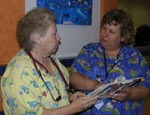


|
Smith takes emergency skills on the roadby Heather WoolwinePublic Relations Pam Smith, R.N., Pediatric Emergency Services, headed home June 8 after teaching a clinic for Trident Technical College students on the MUSC campus. As she traveled up Highway 61 towards Summerville, Smith came upon a car accident that had just happened. Other motorists were stopped and trying to assist the two victims. Knowing that she was likely the only medical professional on site at the moment, she pulled over to offer her assistance. The sight of a bystander holding a limp child in his arms immediately sent her mind reeling. “I know they were trying to help, but that is the absolute last thing you should do when dealing with someone who’s been in a serious car accident, unless of course they are in imminent danger,” Smith said. “I’m pretty tuned into what should and should not happen at the scene of an accident, as my husband works with EMS.” Knowing that EMS had already been called, but unsure of how long it would take them to get there, Smith took control of the situation. She stabilized the child’s neck and began to administer first aid. Riding in the car with his father, the 5-year-old boy’s only protection against the violent ricochet from one tree to another had been the lap belt in the back seat, a seat belt meant to be worn across the shoulders as well as the lap. “I will never forget those little hazel eyes looking up at me,” Smith said. “Children must be in either a car seat or a booster seat until they reach 80 pounds.” As police arrived, they were hesitant to call Meducare without an EMS supervisor on the scene, but Smith insisted, having already assessed the boy’s critical condition and severe back or neck injury. The boy’s father, trapped in the vehicle and also suffering from severe injuries, was able to talk to Smith and describe his areas of discomfort, so she focused on the younger patient already extricated from the vehicle.  Pam
Smith, R.N., right, and Martha Rogers, R.N., discuss a patient's chart. Pam
Smith, R.N., right, and Martha Rogers, R.N., discuss a patient's chart.
“Pam is an excellent emergency department nurse and clinical nurse leader
in Children’s Emergency Services,” said Debbie Browning, R.N., Pediatric
Emergency Department nurse manager. “She is a real advocate of children
in our community, and she displays very child-friendly behavior. She attempts
to make children and their families comfortable in our ED.”
“I will admit that it can be hard to keep your compassion at times,” she said, “But it’s never a child’s fault when something happens to them. I’ve been a nurse for 17 years, and I love working in the pediatric emergency room because I never know what I may do in a given day. There’s just something about administering emergency care that I love, that’s just a part of me. It’s knowing that I can make a real difference in someone’s life and seeing a child who wasn’t supposed to make it walk through the door two months later.” Effective July 1, 2001, the S.C. Legislature passed the following seat belt bill:
Friday, July 2, 2004
|